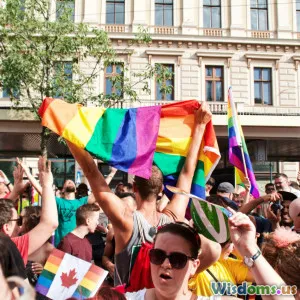
Coping With Societal Pressure As A Same Sex Couple
7 min read Explore strategies and insights to navigate societal pressures faced by same-sex couples, fostering resilience and authentic relationships. (0 Reviews)
Coping With Societal Pressure As A Same-Sex Couple
Introduction
Nearly half a century after the Stonewall riots ignited the modern LGBTQ+ rights movement, same-sex couples still face distinct societal pressures that affect their emotional well-being and relationships. Unlike many heterosexual couples who often receive societal affirmation, same-sex couples can confront subtle discrimination, overt stigma, or expectations that can strain their connection and daily lives. This article aims to illuminate the nature of these societal pressures and offer validated strategies for coping, supported by data and real-world insights. Whether you identify as part of a same-sex relationship or seek to understand and support, this exploration provides actionable perspectives to navigate adversity and nurture authentic love.
Understanding the Spectrum of Societal Pressure
Social Stigma and Its Effects
Despite significant legal progress—such as the U.S. Supreme Court ruling in Obergefell v. Hodges (2015) legalizing same-sex marriage nationwide—social stigma persists. According to a 2022 Pew Research Center study, approximately 37% of LGBTQ+ adults have experienced discrimination because of their sexual orientation. This external judgment often manifests as microaggressions, exclusion, or outright hostility.
These experiences can lead to mental health challenges. The American Psychological Association (APA) highlights that LGBTQ+ individuals, especially same-sex couples, report higher rates of anxiety, depression, and stress-related disorders, linked intimately to societal rejection and pressure to conform.
Cultural Expectations and Family Dynamics
Family plays a critical role in shaping societal narratives. For many same-sex couples, confronting ingrained cultural or religious beliefs in their communities creates additional pressure points. For example, in cultures where procreation within heterosexual unions is emphasized, same-sex couples may face questioning about their family-building decisions or assumptions of invalidity of their relationship.
Internalized Pressure and Minority Stress
Not all pressures arise from external sources; many individuals internalize society’s disapproval or biases, a phenomenon described as "minority stress." This can manifest as self-doubt or shame, contributing to a decrease in relationship satisfaction and personal fulfillment. Clinical psychologist Dr. Ilan Meyer, a pioneer in minority stress research, explains that coping mechanisms and social support are vital buffers to these adverse psychological outcomes.
Coping Strategies for Same-Sex Couples
Cultivating a Supportive Network
A formidable defense against societal pressure is building and nurturing a community of affirming allies and peers. Studies indicate that LGBTQ+ individuals with strong social support experience lower levels of depression and enhanced relationship satisfaction.
Example: The organization The Trevor Project offers crisis intervention and peer support services specifically tailored for LGBTQ+ individuals, providing safe spaces conducive to authentic connection.
Open Communication Within the Relationship
Transparent, empathetic discussion about experiences with societal pressures reduces feelings of isolation and misunderstanding between partners. Psychotherapist Esther Perel emphasizes communication as foundational for intimacy; allowing partners to express vulnerabilities enables joint problem-solving and emotional solidarity.
Advocacy and Visibility
Engaging in activism or community education can transform feelings of helplessness into empowerment. Visibility of same-sex couples who publicly share their stories challenges stereotypes and helps shift cultural norms. For instance, when celebrities like Ellen DeGeneres and Lil Nas X openly discuss their relationships and experiences, they create ripples that normalize diverse love.
Seeking Professional Support
Therapy or counseling inclusive of LGBTQ+ affirming practitioners can offer tailored coping mechanisms and facilitate resilience building. The Human Rights Campaign recommends finding mental health professionals with credentials in LGBTQ+ care to navigate identity-related challenges safely.
Establishing Healthy Boundaries
Setting limits with unsupportive family members or social circles can preserve emotional well-being. Boundaries may involve limiting conversations that are invasive or dismissive and prioritizing relationships that acknowledge and celebrate the couple’s authenticity.
Real-World Insights and Inspirational Examples
Case Study: The Resilient Partnership of Rachel and Mia
Rachel and Mia, a same-sex couple living in a conservative region, faced persistent community skepticism and family rejection. Over time, they developed strategies such as participating in local LGBTQ+ support groups and openly educating acquaintances about their love and commitment. Their story, shared in the documentary "Love Beyond Labels," illustrates how resilience and community engagement can fortify bonds despite widespread societal pressure.
Data-Driven Success Stories
A 2019 study published in the Journal of Social Issues found that same-sex couples who actively participated in LGBTQ+ community events reported significantly higher relationship satisfaction and coping skills. This suggests that connection beyond the dyad provides meaningful resources for endurance.
Conclusion
While societal pressure remains a challenging reality for many same-sex couples, understanding its multifaceted nature and deploying evidence-informed coping strategies can nurture healthier relationships and individual well-being. Cultivating supportive networks, embracing open communication, asserting visible presence, engaging professional help, and protecting emotional boundaries collectively empower couples to thrive authentically. Societal change is ongoing, but the resilience of same-sex couples paves the way toward a more inclusive and affirming future.
The journey of coping and thriving amid societal pressures not only enriches individual partnerships but also contributes to social progress—illuminating pathways for acceptance and equality.
If you’re a same-sex couple navigating these challenges, remember: your experience matters. Seek community, communicate openly, and embrace your authentic story. Your strength shapes the future.
Rate the Post
User Reviews
Popular Posts




















